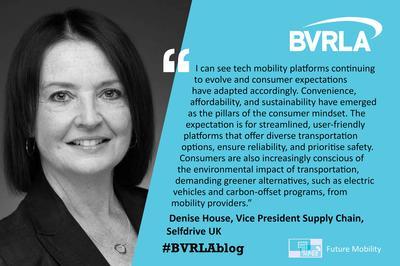Denise House, Vice President Supply Chain, from associate member and mobility tech company Selfdrive UK who offer car and van subscriptions, looks at the changing dynamics of tech mobility platforms and on-demand convenience for consumers.

In recent years, the UK has witnessed a remarkable transformation in the way people move around cities, thanks to the emergence of tech mobility platforms. These platforms have revolutionised transportation, offering consumers a wide range of options beyond traditional modes of commuting. From daily rentals to monthly subscriptions and long-term leases, these platforms have reshaped the expectations of consumers and are altering the way we perceive mobility.
We’ve seen tech mobility platforms, propelled by the convergence of technology and transportation, rapidly gain popularity in the UK. Services like ride-hailing, car-sharing, bike-sharing, and scooter-sharing have become increasingly ubiquitous in major cities. These platforms leverage the power of mobile apps, GPS, and advanced data analytics to provide seamless, convenient, and cost-effective transportation options to consumers.
For daily commuting needs, consumers have come to expect convenient, on-demand access to various modes of transport. Ride-hailing services, have become an integral part of many people's daily routines. With just a few taps on their smartphones, consumers can summon a ride, track its arrival in real-time, and pay digitally. The expectation is for quick response times, competitive pricing, and reliable service, ensuring a hassle-free daily commute.
Tech mobility platforms have introduced subscription-based models that cater to consumers who seek flexibility and value for money. These models allow users to access multiple modes of transportation for a fixed fee, typically on a weekly or monthly basis. There are now subscription plans that enable users to enjoy the benefits of car-sharing or scooter-sharing services without the financial burden of ownership. Consumers expect transparency in pricing, a wide selection of vehicles, and a straightforward booking process that grants them the freedom to switch between modes of transport as their needs change.
Beyond daily and subscription-based services, tech mobility platforms have also disrupted the traditional concept of vehicle ownership through long-term lease options. Some mobility companies provide consumers with the opportunity to lease a vehicle for an extended period, typically ranging from several months to a few years. This approach appeals to those who desire a car for an extended period but prefer to avoid the upfront costs and responsibilities associated with ownership. Consumers expect flexible lease terms, comprehensive maintenance services, and transparent pricing structures that allow them to budget effectively.
I can see tech mobility platforms continuing to evolve and consumer expectations have adapted accordingly. Convenience, affordability, and sustainability have emerged as the pillars of the consumer mindset. The expectation is for streamlined, user-friendly platforms that offer diverse transportation options, ensure reliability, and prioritise safety. Consumers are also increasingly conscious of the environmental impact of transportation, demanding greener alternatives, such as electric vehicles and carbon-offset programs, from mobility providers.
Tech mobility platforms like ours here at Selfdrive UK have brought about a paradigm shift in the way people approach transportation in the UK. From daily rentals to subscription services and long-term leases, consumers now have a wide array of options at their fingertips. The expectations of consumers have transformed as well, emphasising convenience, flexibility, affordability, and sustainability. As tech mobility platforms continue to innovate, integrating new technologies and addressing consumer demands, the future of transportation in the UK appears to be increasingly connected, sustainable, and consumer-centric.





